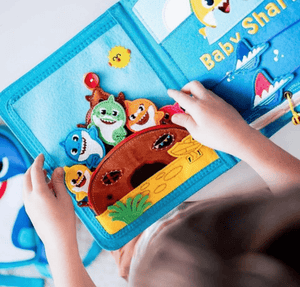Why Busy Books Are Better Than Screens: A Parent's Guide
Dec 31, 2024
Screens often seem like an easy way to keep kids entertained, but their impact on development is worth considering. A growing body of research highlights the drawbacks of screen-heavy activities, particularly fast-paced content and prolonged exposure. Busy books—interactive, hands-on learning tools—offer a healthier, more effective alternative. Here’s why these tactile books are a better choice for your child’s growth and well-being.
1. Engagement and Attention Span
Busy Books Help Kids Focus
Busy books require active participation. Whether it’s solving a puzzle, matching shapes, or exploring textures, these activities demand concentration and mindfulness. They help children develop patience and a longer attention span, skills that are often undermined by screen-based activities.
Screens Promote Shorter Attention Spans
Digital content encourages rapid consumption and shallow engagement. As noted in Forbes article by Mark Travers, “Even brief exposure to fast-paced programming can have detrimental effects on executive functioning—the mental processes responsible for planning, problem-solving, and impulse control.”

2. Cognitive Development
Books Encourage Imagination
Busy books stimulate creativity by requiring children to interact with tactile elements and solve challenges without pre-made visuals. This kind of engagement encourages problem-solving and critical thinking, helping young minds grow.
Screens Are Often Passive
Shows and apps tend to deliver content that requires minimal cognitive effort. As Travers highlights, “The relentless pace of these shows may contribute to a need for instant gratification, where children expect constant stimulation and struggle to engage in activities that require sustained effort.”

3. Sensory Experience
Books Offer Hands-On Engagement
Busy books bring learning to life with textures to touch, pages to turn, and pieces to move. These physical interactions engage multiple senses, making the learning experience richer and more memorable for kids.
Screens Overload the Senses
Screens bombard kids with bright lights, rapid movements, and constant sounds, overwhelming their sensory systems. This overstimulation can reduce their ability to process information and enjoy quieter, focused moments of play.

4. Eye Health
Books Are Gentle on the Eyes
Reading a busy book or flipping through its interactive activities is visually soothing. There’s no blue light or glare—just an engaging, comfortable experience for your child’s eyes.
Screens Can Cause Digital Eye Strain
Extended screen time has been shown to interfere with natural blinking, reducing it by 30-50% compared to other activities. As highlighted by Ohio State Medical Center , this reduced blink rate can cause dryness, irritation, and discomfort in the eyes. They also note that prolonged use of screens disrupts the tear film, leading to blurry vision and symptoms like burning or redness. Limiting screen use and opting for books is a simple way to protect your child’s eye health.

5. Emotional Connection
Books Foster Relaxation
When kids immerse themselves in a busy book, they slow down and become present in the moment. This focused play promotes relaxation, reduces stress, and creates a sense of accomplishment.
Screens Often Overstimulate
The fast pace of screen-based entertainment can leave children overstimulated, leading to irritability and difficulty winding down. By offering a busy book instead, you provide your child with a calming yet stimulating activity.

6. Learning and Retention
Books Enhance Memory
Busy books involve repeated, hands-on activities that reinforce learning and improve comprehension. This type of tactile engagement aids in long-term memory retention.
Screens Encourage Skimming
Screens often encourage skimming and multitasking, habits that undermine deep understanding and memory formation.

7. Social and Emotional Skills
Books Foster Empathy
Many busy books include relatable scenarios or characters that encourage kids to see the world from different perspectives, building emotional intelligence.
Screens Can Isolate
Overreliance on screens often replaces meaningful social interactions. In contrast, busy books encourage collaborative play and bonding, whether with parents, siblings, or friends.

Conclusions: Busy Books Offer a Smarter Way to Play
While screens may be unavoidable in the digital age, busy books provide a thoughtful alternative that promotes focus, creativity, and healthy sensory development. They engage children in ways that fast-paced, overstimulating screen content simply cannot.
Looking to try one? Check out the carefully curated selection at My First Book for an enriching addition to your child’s playtime.
FAQs
1. What is a busy book?
A busy book is an interactive, hands-on learning tool filled with activities like puzzles, textures, and matching games to keep kids engaged.
2. Why are busy books better than screens?
Busy books offer focused, hands-on play that improves cognitive and sensory development without the distractions and overstimulation of screens.
3. Are busy books suitable for all ages?
Absolutely! Many busy books, like those at My First Book, are designed for toddlers and preschoolers but can be tailored for older children too.
4. Can busy books replace screen time?
While it’s difficult to eliminate screens entirely, using busy books as an alternative can significantly reduce reliance on digital devices while encouraging learning and creativity.
5. Where can I find high-quality busy books?
You can find Montessori-inspired busy books designed to engage and educate at My First Book.


